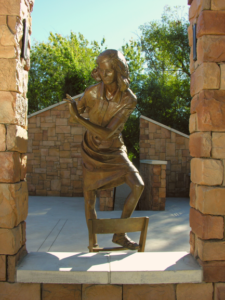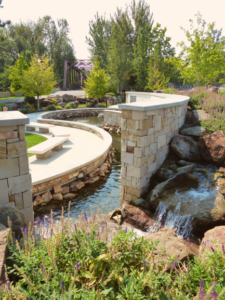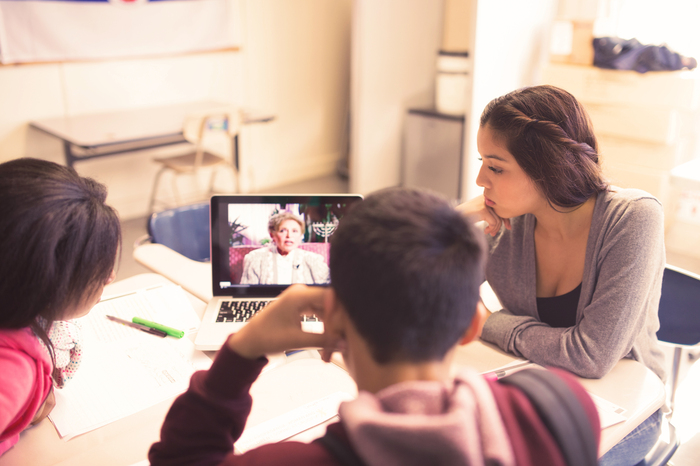
HOLOCAUST REMEMBRANCE
TEACHING

Idaho social studies educator Ben Harris suggests, “The Idaho Anne Frank Human Rights Memorial doesn't seem to be a place of commemoration or sadness – what one might experience in a battlefield or concentration camp. Instead, it invites students to consider a variety of perspectives about human rights and ask questions.”
A study by the Pew Research Center released in January 2020 found that visiting a Holocaust museum or memorial is strongly linked with Holocaust knowledge. A visit to a museum or memorial takes Holocaust education out of the classroom, while encouraging learning approaches and outcomes that are central to Echoes & Reflections pedagogy: inquiry-based learning and critical thinking, fostering empathy, and making the history relevant for students. These visits help students develop a personal connection to the Holocaust.
“Dear Kitty … No one is spared. The sick, the elderly, children, babies and pregnant women – all are marched to their death. I get frightened myself when I think of close friends who are now at the mercy of the cruelest monsters ever to stalk the earth. And all because they’re Jews.” - Anne M. Frank, November 19, 1942
Etched in the stone of the Idaho Anne Frank Human Rights Memorial in Boise, Anne’s diary entry illustrates how a group of people who are marginalized or demeaned based on religion, race, ability, gender, sexual orientation or gender identity become viewed by a majority as “the other” and therefore less than or inferior. It’s a stark reminder of what can happen when we fail to interrupt the Spiral of Injustice, a model we created for discussing the Holocaust, the attack or harassment of an Idaho student when he or she is viewed as “the other,” or the marginalization of any group within the fabric of our community.
The Wassmuth Center was founded in 1996 for the purpose of constructing a memorial to human rights. That vision became a reality when the Idaho Anne Frank Human Rights Memorial opened to the public in 2002. Inspired by Anne Frank and funded through the generosity of individual and corporate donors, the Memorial is not simply a static space to reflect on her short life or even on the horrors of the Holocaust. Instead, it was designed to actively engage visitors to think, to talk with one another, and to respond to the human rights issues we face in our community, our country and our world.
Both the triumphs and tragedies of the human story are on display but, in every quote and every idea, visitors see the profound power of a single voice or bold action to overcome great odds and alter the course of history.
The educational park includes: a life-sized bronze statue of Anne Frank as she peers out an open window into an adjoining amphitheater, 80 quotes  etched into the stone throughout the Memorial, the full text of the Universal Declaration of Human Rights on permanent display, the Rose Beal Legacy Garden honoring a local Holocaust survivor, a sapling from the Anne Frank Chestnut Tree in Amsterdam, the Marilyn Shuler Classroom for Human Rights, recognizing a founder of the Memorial and the state’s first director of the Human Rights Commission, and state-of-the-art electronic technology showcasing the “History of Human Rights in Idaho.”
etched into the stone throughout the Memorial, the full text of the Universal Declaration of Human Rights on permanent display, the Rose Beal Legacy Garden honoring a local Holocaust survivor, a sapling from the Anne Frank Chestnut Tree in Amsterdam, the Marilyn Shuler Classroom for Human Rights, recognizing a founder of the Memorial and the state’s first director of the Human Rights Commission, and state-of-the-art electronic technology showcasing the “History of Human Rights in Idaho.”
Ryan Coonerty, in the National Geographic publication Etched in Stone: Enduring Words from our Nation’s Monuments, commented, “Anne Frank could scarcely have conceived of Boise, Idaho. Therefore, it seems improbable that the author of a diary that has become among the world’s most widely read books has become a symbolic fixture of this community almost 60 years after her death.”
The Memorial receives an average of 120,000 visitors annually, with over 10,000 K-12 and university undergraduate students participating in free docent-led tours.
How does a visit to the Memorial inspire and impact teaching and learning about the Holocaust?
A visit to the Idaho Anne Frank Human Rights Memorial is far more than a fieldtrip and can provide a strong foundation for when educators return to the classroom and continue to teach the lessons of the Holocaust and other genocides. It is the recognition, as stated by Edmund Burke, “All that is necessary for the triumph of evil is that good men [and women] do nothing.”
Consider and ask. When visiting a memorial or museum, the site can introduce a different perspective and an opportunity to ask probing questions.
We see that happen on tours when either a classroom educator or Memorial docent asks each participant to select his/her favorite quote in the Memorial. The process of selection includes both introspection and reflection; do I see myself in the quote and what does it mean to me? As students begin to share their selections, the conversation becomes a moment of personal journeys.
High school English teacher Sharon Hansen adds, “While the quotes are available in a booklet or in a digital version, we choose to visit the site, where we feel the presence of Anne Frank looking out over us as we write-- she forever frozen in her hiding place, while those of us who are alive and free have an opportunity to write about injustice in order to move toward justice.”
Power of place. At the entrance to the Memorial, visitors read a welcome written by one the Memorial’s three founding mothers Rev. Dr. Nancy Taylor. “May the Idaho Anne Frank Human Rights Memorial stand as a tribute to Anne Frank’s memory, as a warning to any who would dare trespass upon the freedoms of others, and as an inspiration to all whose lives are devoted to love, respect, understanding, peace, and good will among the totality and diversity of the human family. May this memorial inspire each of us to contemplate the moral implications of our civic responsibilities.”
Visitors experience the place – it is a physical, emotional, and some might add, a spiritual experience that evokes connections.
Hansen shares, “For my Creative Writing students, a visit to the Memorial is a call to action. Their writing takes on new purpose, one determined by the place, and one I cannot duplicate in the classroom. The Anne Frank Memorial is a place of inspiration, calling forth the words of my students to amplify the Memorial’s message.”
Behind the statue of Anne Frank, the actual size of the family rooms in the secret annex is cut into the concrete; one point of access into the rooms is  up a nine-step staircase tucked behind a marble bookcase, and the surrounding walls mirror the Amsterdam skyline.
up a nine-step staircase tucked behind a marble bookcase, and the surrounding walls mirror the Amsterdam skyline.
Memorial visitors are able to step into her diary. And we point to a quote by the American journalist Judith Miller that sits adjacent to the Memorial’s entrance. “We must remind ourselves that the Holocaust was not six million. It was one, plus one, plus one …” Anne Frank was one, her sister Margot was one, their mother Edith was one …
Never Again, Never Forget. We recite it, we mean it – but genocide continues to happen. Notably, George Santayana’s words are also inscribed in the Memorial. “Those who cannot remember the past are condemned to repeat it.”
In addition to the Holocaust, we talk about the Armenian, Cambodian, Ukrainian, Rwandan and Bosnian Genocides. Students are apt to point out that “never again” rings hollow. Another quote, placed on a rock by the family of a Holocaust survivor, insists, “Never again is now.”
Recognized as a member in the International Coalition of Sites of Conscience, the Memorial joins a network of historic sites, museums and memory initiatives that connects past struggles to today’s movements for human rights. The Idaho Anne Frank Human Rights Memorial commits to turning memory into action.
Hansen notes, “The Boise River flows along the Memorial, perhaps echoing the words of Martin Luther King Jr. ‘Let justice roll down like waters and righteousness like a mighty stream.’ By being present at the Memorial, students are surrounded by the words of Haim Ginott, Sojourner Truth, and Nelson Mandela, and the language becomes a springboard for students’ own yearning toward a free and just future.”
And “in spite of everything” Anne still believed that “people are truly good at heart.”
About the author: Dan Prinzing, Executive Director of the Wassmuth Center for Human Rights in Boise, Idaho, has a BA in History Secondary Education, an MA in Curriculum and Instruction, an MA in History and Government, and a Ph.D. in Educational Administration. Prior to the current position, he was the Idaho State Department of Education’s coordinator of civic and international education, the former SDE coordinator of social studies and curricular materials, and a language arts and history teacher in the Boise School District.
To learn more about the Anne Frank please explore our additional resources on her life and legacy:




This site contains links to other sites. Echoes & Reflections is not responsible for the privacy practices or the content of such Web sites. This privacy statement applies solely to information collected by echoesandreflections.org.
We do not use this tool to collect or store your personal information, and it cannot be used to identify who you are. You can use the Google Analytics Opt-Out Browser Add-on to disable tracking by Google Analytics.
We currently do not use technology that responds to do-not-track signals from your browser.
Users may opt-out of receiving future mailings; see the choice/opt-out section below.
We use an outside shipping company to ship orders. These companies are contractually prohibited from retaining, sharing, storing or using personally identifiable information for any secondary purposes.
We may partner with third parties to provide specific services. When a user signs up for these services, we will share names, or other contact information that is necessary for the third party to provide these services.
These parties are contractually prohibited from using personally identifiable information except for the purpose of providing these services.
1. You can unsubscribe or change your e-mail preferences online by following the link at the bottom of any e-mail you receive from Echoes & Reflections via HubSpot.
2. You can notify us by email at info@echoesandreflections.org of your desire to be removed from our e-mail list or contributor mailing list.




